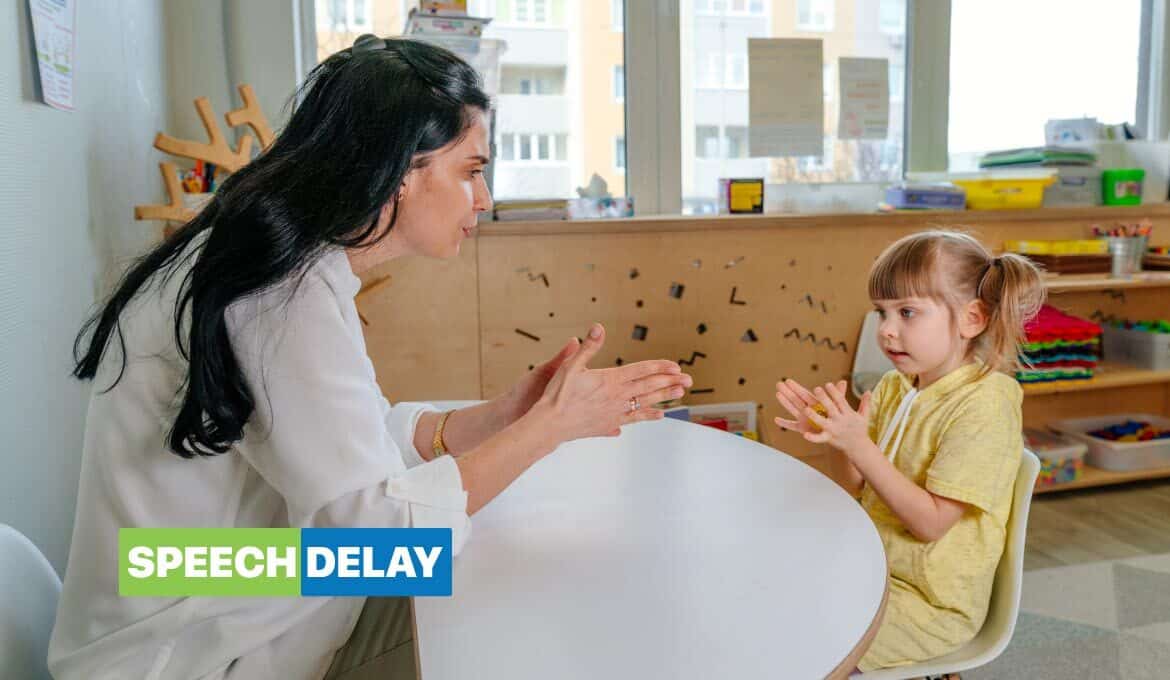
A child is said to have a speech delay if their verbal development is clearly behind that of children of the same age. Speech delay is a common concern in young children.
Speech delay can slow a child’s overall growth by impacting their social and personal skills. Therefore, you must immediately address any causes of speech delay in your child.
In this article, we will look at speech delay, its causes, and how to manage the same.
What is Speech delay?
Speech delay is a condition where a child's ability to learn speech is slower than expected. This indicates that they talk less fluently than peers of their age. By age two to three, an average human child begins to speak simple words with varying degrees of articulation.
The speech development of a kid with a speech delay is comparable to that of a developing child who is younger chronologically; the speech-delayed child's skills are learned in the expected order but at a slower rate than usual.
The worry is justified because a number of developmental issues go hand-in-hand with speech delay.
Moreover, a delay in speech development can significantly impact children's emotional, social, and academic life. Early detection and effective care can reduce this disability's emotional, social, and cognitive disadvantages and enhance the outcome.
Causes of Speech Delay
Speech delay can occur due to the following reasons. They include:
Cerebral defect
Underlying medical conditions like neurological problems can cause delays in speaking. Autism and cerebral palsy are two intellectual impairments linked to speech delay.
Therefore, if a child displays signs of one of these medical conditions, their speech development may be delayed.
Hearing loss
Children learn to talk and understand by hearing noises and words. These sounds are not heard by a child who has hearing loss. Speaking, reading, academic success, and social skills may suffer as a result.
If you suspect your child has hearing loss, having them checked is crucial. Early assistance is essential.
Mouth Problems
An issue with the mouth or tongue might cause speech delay in some children. Sometimes, the tongue is connected to the floor of the mouth. This is known as ankyloglossia or “tongue tie.” This can make it difficult to pronounce certain syllables.
Lack of a conducive environment
Children require ample stimulation from their environment to develop effective speech. Neglect, lack of attention, and abuse can cause significant delays in developing speech.
It is important that you engage verbally with your child and provide them with the necessary attention in their early years for them to develop effective speech.
Signs of speech delay
Speech delay is characterized by a child's slower development of speech and communication. This could be noted by their limited vocabulary when compared to their peers.
Some signs of speech delay include:
Till 12 months
Babbling begins shortly after birth, and Children aged 2 to 3 months may start smiling and cooing at you. Clarity and a combination of their vocalizations will progress as they grow and learn.
Around 8 to 10 months, most children can respond when their names are called, usually by turning their heads to the speaker.
At 12 months
At this point, your child should be able to use gestures. They should also be able to babble by uttering a few words. They might have delayed speech if they cannot speak simple words (like dada or mama).
At 18 months
Your child should be able to express their wants or combine words to form two-word phrases by the age of 18 months.
An indication of a speech or language delay is when a child prefers to communicate through gestures rather than words. Your child may also have trouble mimicking noises and following simple vocal commands.
2 to 3 years old
If your child can mimic voice and actions but cannot speak words or form phrases, they may have a speech delay.
Other indications include the incapacity to communicate beyond their immediate demands and trouble following simple instructions. Additionally, you could notice that your child has a raspy or nasally voice.
By the time they are three years old, your child might also begin using short sentences when speaking. At this age, parents should be able to understand between 50 to 75 percent of their child's speech at 2 and 3 years, respectively.
Four years old
Your child should be able to communicate verbally by the age of four. They should be able to express their wants clearly and form concise sentences. Language delay is seen by the inability to select words and combine them easily.
Treatment for Speech Delay
Treatment for speech delay is as follows:
-
Speech or language therapy
Speech or language therapy is the first-line treatment for speech delay. During this treatment, the speech therapist works directly with your child and will instruct you on how to help the child with therapy at home.
With early detection, your child may be able to speak by the time they are ready to enter school.
-
Early intervention
Research has suggested that children with speech delay at 2.5 to 5 years will have difficulty learning and communicating in elementary school.
Additionally, speech delay might also lead to behavioral and socialization problems. With early diagnosis with the help of a qualified speech pathologist, your child may develop speaking skills before they go to school.
-
Treating underlying health conditions
When speech delay is caused due to some underlying health condition, it is crucial to address the problem immediately. Such conditions include:
- Treating hearing problems
- Addressing problems related to mouth and tongue,
- Physical therapy
- Occupational therapy
- Applied Behavior Analysis therapy (ABA)
- Treating the neurological disorder
How can parents help their child with speech delay?
Parents can help their child with speech delay by following some of the steps mentioned below:
- Talk to your baby every day
- Use gestures, objects, colors, people, and words so the child can easily reciprocate what you're saying.
- Read books to them and talk about pictures as you read
- Sing songs with body movements
- Pay complete attention as you talk to them
- Dont answer for them when others ask them questions
- Let your child interact with children who can speak, as this can help them develop communication better
- Ask questions and give them ample time to answer
- Be patient with your child and create a positive environment to help them improve.
Conclusion
Speech delay is a common problem in children and can be treated with early detection. In some instances, speech delay is due to some underlying health problem. Seek medical intervention to avoid any risk.
A child can easily overcome this condition with enough effort and adequate attention from parents.
FAQs
1. What are the effects of speech delay?
Ans: Speech delay can affect a child’s life beyond their inability to speak. It can negatively impact the personality and social development of a child. It can also make it difficult for them to convey their needs and wants.
2. What can parents do to prevent speech delay in their children?
Ans: A stimulating and conducive environment is a vital factor in developing speech. Engaging with your child verbally and giving them your undivided attention can go a long way. Besides this, using visual cues and reading to them can be helpful.
3. What underlying causes can lead to speech delay?
Ans: Speech delay can be caused by several underlying conditions like tongue tie, being on the autism spectrum, neurological problems, hearing impairment, and neglect from parents.
4. Can speech therapy be performed at home?
Ans: Speech therapy requires the guidance of a qualified professional to treat speech delay effectively. However, it can be performed at home in conjunction with and at the instruction of a professional therapist’s care.
5. Can speech delay be cured?
Ans: Speech delay can be treated in most cases by addressing the underlying cause. Issues related to behavior, environment, and parenting are easier to treat using therapy. Other conditions like hearing impairment, neurological disorders, autistic spectrum, and tongue tie might be more difficult to treat.
Read Also:

